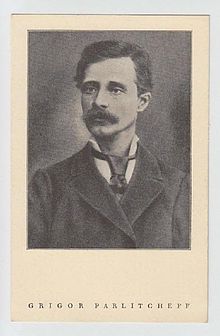Grigor Parlichev
Grigor Stawrew Parlitschew (also Pârlichev , Bulgarian Григор Ставрев Пърличев , Macedonian Григор Ставрев Прличев (Grigor Stavrev Prličev); * 18th January 1830 in Ohrid , Ottoman Empire , now in Macedonia , † 25. January 1893 ) was a Bulgarian writer.
Life
Parlichev attended a Greek-language school in Macedonia . In the 1850s he worked as a teacher in Tirana , Prilep and Ohrid . In 1858 he began studying medicine in Athens , but then switched to the linguistic faculty.
In 1860 his ballad O Armatolos (Ο Αρματωλός, Bulgarian Serdar ), written in the Greek language, won first prize at the annual poetry competition in the Greek capital. From then on, Parlitschew was considered the second Homer of the Greek language and was then offered scholarships to the universities of Oxford and Berlin . But he did not go to Western Europe.
Since 1862 Parlitschew was involved in the fight against the Greek-speaking church and school system in still Ottoman Macedonia. During a stay in Constantinople he had familiarized himself with the old Bulgarian written language and literature in the libraries there.
In 1868 he was imprisoned for a few months for his commitment because he had been reported as a troublemaker by the Greek bishop in Ohrid. In 1870 Parlichev translated his ballad Serdar into his mother tongue. Since then he has only written and published works in his mother tongue. He was the first to translate Homer's Iliad ; however, the dialect and style of its transmission has been severely criticized on various occasions by Bulgarian writers and poets (such as Christo Botew ) for using the Ohrid dialect and not the high-level Bulgarian literary language.
After that, however, he continued to work as a teacher not only in Macedonia, including in Struga , Gabrowo (now Bulgaria), Bitola and Thessaloniki . For a short time Parlitschew worked in the newly founded National Library in Sofia . In Thessaloniki he wrote his autobiography in 1885.
Parlichev had two children: the son Kiril Parlichev , who worked in IMRO , and a daughter. Today, Bulgarians and Macedonians regard him as a member of their respective people.
Works
- Сердарят (Serdar)
- Скендербей ( Skanderbeg )
- Чувай ся себе си , 1866
- Възпитание или дванадесет песни за деца (Education or Twelve Songs for Children)
- Автобиография , 1885 (autobiography)
- Кратка славянска граматика (Short Slavic Grammar)
literature
- Aleksandar Spasov (ed.): Životot i deloto na Grigor Prličev. Referati od naučen sobir održan vo Skopje on 21 and 22 April 1993 godina. Skopje 1994. (Life and work of Grigor Prličev. Lectures given at the scientific conference in Skopje April 21 and 22, 1993).
- Diana Ivanova: Григор Пърличев и българската книжовноезикова ситуация през 60-те - 80-те години на XIX век. Plovdiv 1995 (Grigor Prličev and the situation of Bulgarian literature in the 60s and 70s of the 19th century).
Individual evidence
- ↑ Cf. Grigor Parlitschew: Autobiography , Thessaloniki 1885, p. 12, p. 18; Detrez, Raymond (2007). Canonization through Competition: The Case of Grigor Părličev . Literature institute, pp. 57-58. Macedonians as a people and the Macedonian language has only existed since 1943, before that the later Macedonians viewed themselves either as Bulgarians or as Serbs.
Web links
- Autobiography (bulg.)
- Serdar (Engl.) ( Memento of 23 May 2009 at the Internet Archive )
- Simeon Radew about Grigor Parlitschew in his autobiography "Ранни спомени" (Early Memoirs) in slovoto.bg (bulg.)
| personal data | |
|---|---|
| SURNAME | Parlichev, Grigor |
| ALTERNATIVE NAMES | Prličev, Grigor Stavrev |
| BRIEF DESCRIPTION | Bulgarian writer |
| DATE OF BIRTH | January 18, 1830 |
| PLACE OF BIRTH | Ohrid |
| DATE OF DEATH | January 25, 1893 |
| Place of death | Ohrid |
